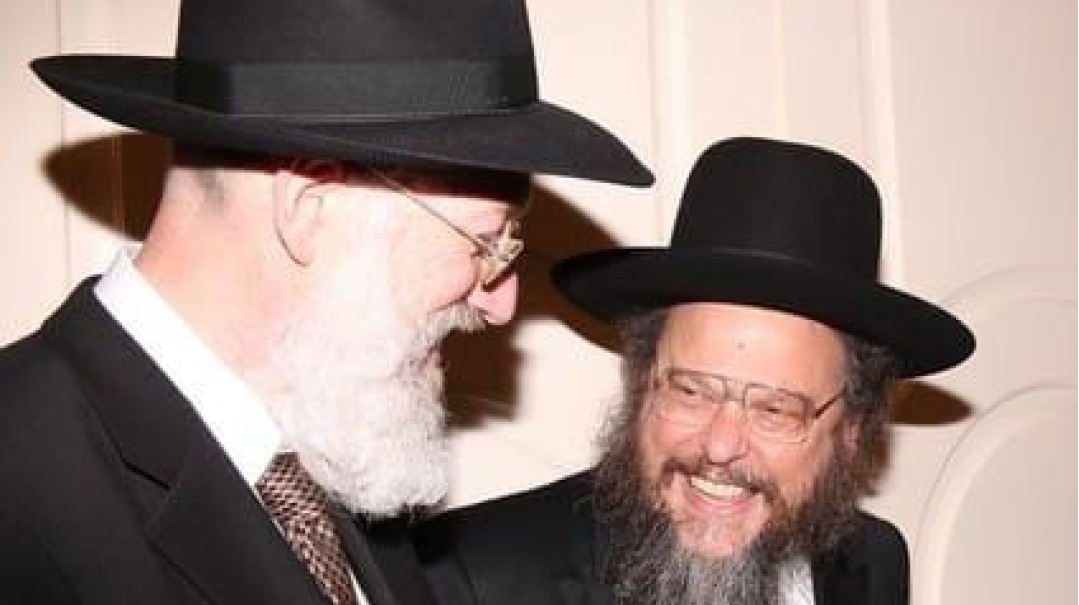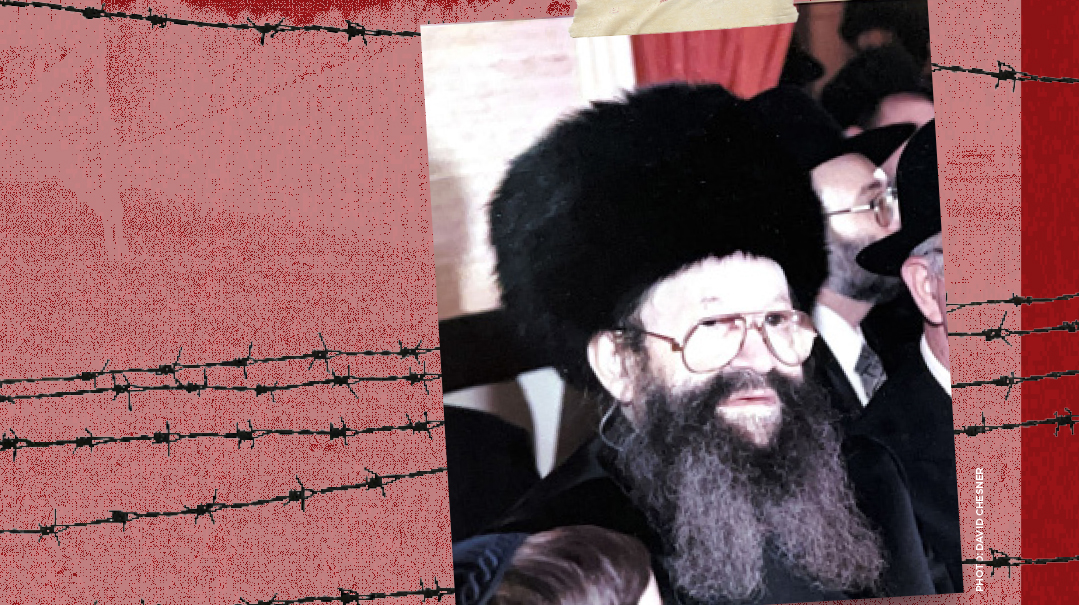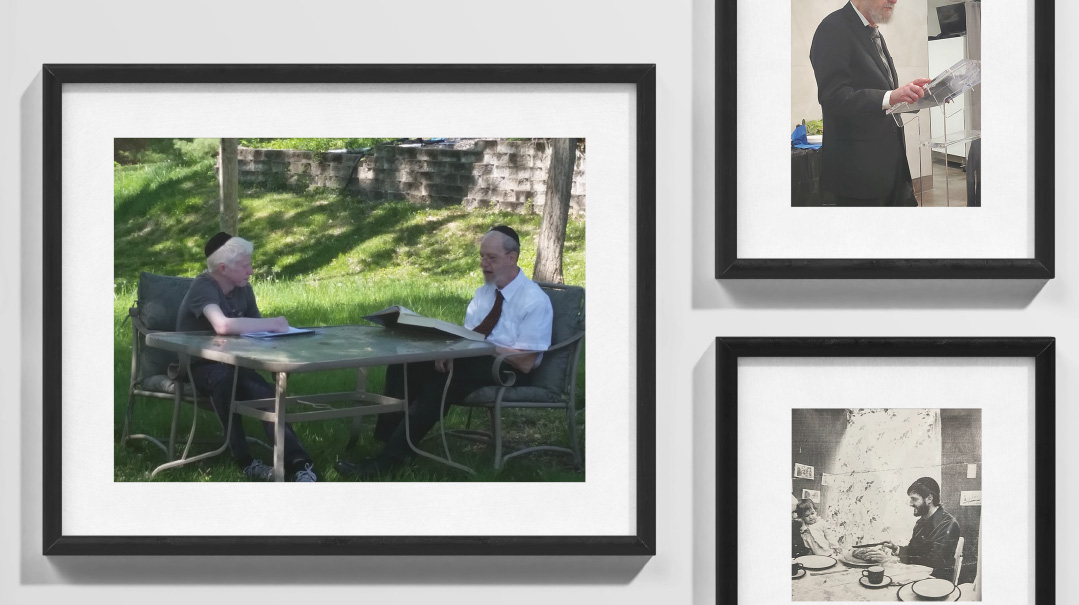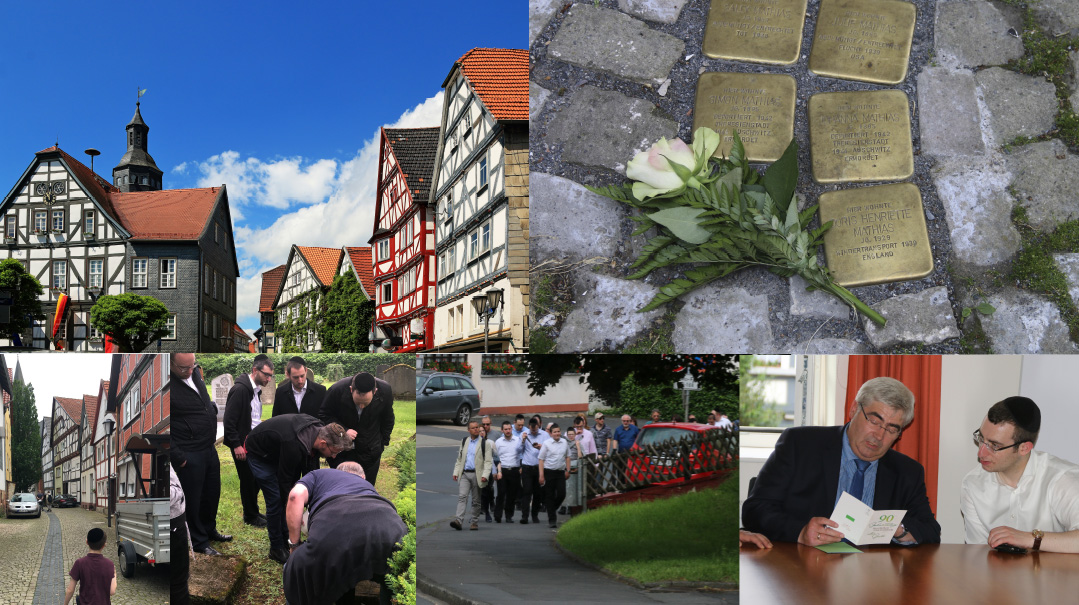Eighty-Five Years in the Making

An honorable Japanese diplomat put his career on the line, granting more than 2,000 visas to Lithuanian Jews fleeing the Nazis — in defiance of orders from Tokyo

Sugihara. Just hearing the name evokes a visceral reaction. An honorable Japanese diplomat put his career on the line, granting more than 2,000 visas to Lithuanian Jews fleeing the Nazis — in defiance of orders from Tokyo in 1940 to cease and desist.
Many have heard this story, but for my family, it is our story. My grandfather, Rabbi Yisroel Zev (Velvel) Zoimen from Baranovich, and my wife’s grandparents, Rabbi Avigdor and Elka Cyperstein from Pinsk, escaped to Shanghai thanks to Chiune Sugihara’s efforts. When I chanced upon a flier announcing that Chiune Sugihara’s grandson Chihiro would be speaking at our local Holocaust center, I knew our family had to be there.
The night of the event, it was pouring buckets. We were late — the MC had just introduced Chihiro Sugihara — and we crept quietly into the full auditorium, sliding into some seats at the side marked, “reserved,” the only section still empty.
I glanced around. The crowd reminded me of the shuls in those small Jewish communities you pass through on vacation, average age 75. There were plenty of walkers, but we had the only stroller.
Abie Rotenberg’s words played in my mind: And who will stand before the world, knowing what to say, when the very last survivor fades away? I had schlepped my kids here for this very reason; where were their middle-aged children and why was there only one other yarmulke in this audience?
Chihiro was sharing a PowerPoint presentation about his grandfather’s early life. I didn’t know what to expect — was he here for noble reasons or was he just riding his grandfather’s legacy? But it soon became clear that it was the former.
He squirmed onstage, looking like he would much rather be somewhere else. He was self-conscious about his thick accent and his command of English, offering cute, self-deprecating lines (“My grandfather taught me English, but I was a poor student”) and raw, honest responses to questions. His presentation had spelling mistakes, which just made it more authentic.
Chihiro, who had lived with his grandfather for the first 20 years of his life, described him as a quiet man who worked hard. Chihiro did not grow up on stories about the war or the exciting life at the consulate; his grandfather kept his heroism a secret most of his life, exposed only near the end of his days by a persistent Israeli he had saved who was determined to track him down in Japan and give him proper recognition.
Chihiro learned from his grandfather’s mesorah, apparently. The Jewish man who arranged that night’s event told me later that for months, he had spent hours daily with Chihiro when they worked alongside each other on a project. Only after a year did Chihiro open up — he was that Sugihara.
Chihiro talked about his grandfather’s perfect math scores (nachas to his Japanese parents), and his decision to become a diplomat instead of a doctor, against his father’s wishes (the opposite of nachas; it cost him his parents’ financial support). Then he came to the visas — the appointment of Chiune Sugihara as Japanese consul in Kovno. When Jews fleeing the Nazis crossed the line of Soviet control to come to him, he started writing exit visas allowing them transit through Japan.
Though he was told by his superiors to stop, the pleading crowds at his doorstep pushed him to make a fateful decision. He defied the orders and continued writing visas, saving thousands of lives.
At that point, someone was invited up to read from Chiune Sugihara’s translated diary, giving us a glimpse into his thought process. Listening to the reading, we felt we were living in his head in 1940. He agonized over the decision, but after he made it, he never looked back: It was the right thing to do, plain and simple.
But in Japan, rules and hierarchy are taken very seriously. The most important civic virtue is to conform to expectations, and garnering respect is the ultimate goal, not heroism. Defying orders and continuing to grant hundreds of visas a day, Chiune knew, would end his career. Here was someone who had defied his father’s wishes 20 years earlier to become a diplomat, causing him to be cut off financially; and here he was, defying his superiors and his country and putting himself at risk again. Although Japan’s policy was made clear, Chiune came to the independent decision that these refugees needed his help.
The PowerPoint ended and the program continued with a conversation onstage between Chihiro and a middle-aged woman whose father had fled from Lodz to Vilna and was saved by one of Sugihara’s visas. Chihiro’s answers to her questions were brief — timidly contrasting his family’s low standing in Japan after his grandfather’s demotion with his international fame after his heroics came out, brushing off the debt the world owes to his family. He avoided sensationalism and just stuck to the facts he knew, but he was clearly proud of his grandfather.
As the program wound down, the MC opened the floor to questions. A person in the front asked Chihiro about his own career and the industry he worked in (jewelry). I wondered if for some in this crowd, this was just another interesting story, a PBS special playing out before them live: the historical account of a man who stepped up, an “upstander” as the new world defines them.
If so, they were missing the point. We are living this history.
Chiune Sugihara was the heavenly shaliach who enabled the entire Mir Yeshivah to survive, to continue learning in Shanghai, and to move to Jerusalem, where there are now over 9,000 talmidim sitting and learning in 238 unique chaburos. This man gave transit visas to our gedolim — to the lion of the Mir, Rav Leib Malin; to the rosh yeshivah, Rav Chaim Shmuelevitz; to the mashgiach, Rav Chatzkel Levenstein; to a young Shmuel Berenbaum, and to so many others. This was the man who saved those giants, enabling Torah in the new world.
There was time for only one more question, and I raised my hand. I planned to thank Chihiro publicly, to tell the story of my zeidy’s miraculous escape. I wanted this crowd to see that our story continues, that we are here living as Yidden, that no matter what the world throws at us, in every generation, Torah perseveres.
I wanted to tell them that Rav Avraham Yaffen obtained two sought-after visas authorizing travel to America and chose to give them to Rabbi Yehuda Leib Nekritz (his future son-in-law) and Zeidy — Rabbi Yisroel Zev (Velvel) Zoimen, an act that attests to the closeness, love, and respect Rav Yaffen felt for him. But Zeidy gave this lifeline to a relative who was sick at the time.
Zeidy learned in the Pinsk-Novardok yeshivah, but with the Soviet takeover of Kovno, he needed to escape. He considered joining the Mir Yeshivah, to try to get to Japan, but his rebbeim were against it, as the Mir’s planned escape route was considered very dangerous. Zeidy performed the complicated goral haGra to decide whether or not to join the Mir. It revealed the pasuk from Tehillim (118:15), “Kol rinah viy’shuah b’ohalei tzaddikim, yemin Hashem osah chayil — The sound of rejoicing and salvation is in the tents of the righteous, Hashem’s right hand makes valor.” He followed the goral and was the only one from his yeshivah to join the Mir, to stay in the ohalei tzaddikim.
I wanted to tell this crowd that getting a coveted Japanese visa was no easy task; thousands were waiting. To reduce the crowds at the consulate, the Soviets distributed cards with dates printed on them, and a refugee seeking a visa could come only on the date printed on his card. Zeidy and his dear friend Rabbi Shloma Margolis were each given cards with the date “17.” On the sixth day of that month, they saw that issuance of visas was ending and would long be over on the 17th. They decided to cut off the number “1” so the card would read “7.”
The next day, Zeidy and Rabbi Margolis got in different lines to wait for visas. Zeidy saw Rabbi Margolis arrested for altering his card; he was immediately sent to Siberia. Although Zeidy was terrified, he continued to wait in line, and b’chasdei Hashem, received his visa undetected. He was able to eventually get to Kobe, Japan, then Shanghai, China, and then to Chicago, where he got married and built a beautiful family. (Rabbi Margolis survived Siberia and made his way to Bnei Brak; his granddaughter married my brother 60 years later.)
Rabbi Avigdor Cyperstein, who escaped with the Mir Yeshivah, became very close to Zeidy in Shanghai. Their relationship continued while Rabbi Cyperstein was the rosh yeshivah in Yeshivas Rabbeinu Yitzchok Elchonon in New York, and my zeidy was a shochet in Chicago. In 2006, I married his great-granddaughter Adina.
I wanted to describe the plight of the Cyperstein family, who needed visas not only for my wife’s great-grandfather and his wife, but for their two young children as well. (A third was born in Shanghai, where Rabbi Cyperstein learned b’chavrusa with the Mir Rosh Yeshivah, Rav Chaim Shmuelevitz.) After the war, the Cypersteins settled in Queens, where Rabbi Cyperstein became a rosh yeshivah. He subsequently took the position of Chief Rabbi of Argentina, and later in life, they settled in Eretz Yisrael. Rabbi Cyperstein taught thousands of talmidim during his incredible lifetime — all because of Chiune’s heroism.
Our family — my wife, our six children, and I — are here because of Chiune Sugihara.
As the microphone made its way to my side of the room, I couldn’t get out any of the story I wanted to tell. The emotion held back my words.
Instead, I looked directly at Chihiro Sugihara and said, “I just want to say thank-you. My grandfather got a visa from your grandfather, my wife’s great-grandfather got a visa from your grandfather, so our whole extended family is here because of him.”
Thunderous applause. Surprised faces in the crowd, that this young family in the back corner is connected to this man of Japan in such a real way, people murmuring in hushed tones, “Did you hear? Both their families were saved by him.”
In a voice laden with emotion — his most emotional that evening — Chihiro responded with a simple, “I think my grandfather would be very proud.”
With that, the program ended. We were escorted up front to greet Chihiro personally. As we made our way, we were peppered with questions, almost like celebrities. People in this crowd finally saw the Sugihara story is real and alive — and still being written in cities and countries all over. From my grandfather’s one visa came over 100 descendants; the same with my wife’s family, generations still being spawned by survivors who rose from the ashes and rebuilt Yiddishkeit.
A woman in her 80s wanted to know where my grandfather was born.
“Baranovich,” I told her.
“Where is that?” she asked.
“Russia,” I answered, and she told us about her family’s hometown in Russia.
I shared the story of the “17” that was made into a “7,” as well as a cute anecdote about the 50-year-old letter from my wife’s great-grandfather to my grandfather that I shared with my potential shver, Reb Aaron Cyperstein, before our second date (“Even if the shidduch doesn’t work out, you’ll at least have this letter,” was my line).
The crowd petered out as we continued up to the area in front of the stage, where Chihiro Sugihara stood. I approached him and quietly asked if I could give him a hug.
He nodded, and I embraced him.
It was a hug that transcended centuries, a hug in memory of my zeidy, who was niftar 12 years ago at the age of 100, who sat and learned for hours every day until his petirah. And it was a hug on Klal Yisrael’s behalf — for the people saved, for their children, grandchildren, great-grandchildren, and great-great-grandchildren, thousands upon thousands of Yidden whom Chihiro’s family will never meet, but who have eternal hakaras hatov to this special Japanese family that allowed us to continue building generations of Yiddishkeit. —
(Originally featured in Mishpacha, Issue 1011)
Oops! We could not locate your form.







